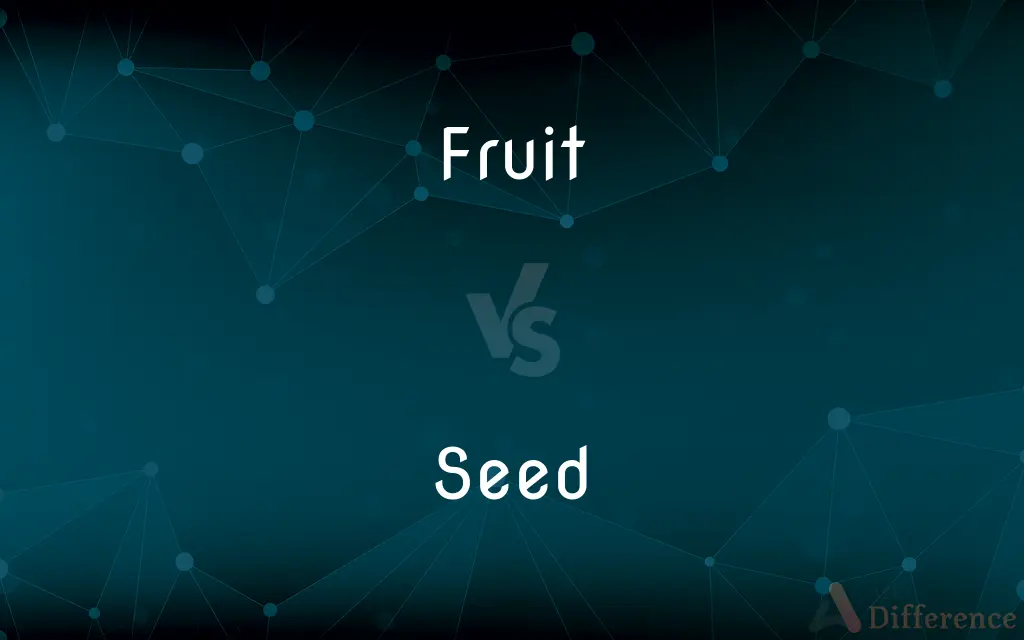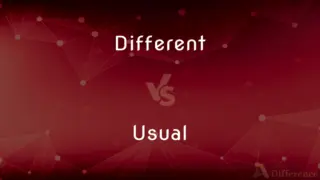Fruit vs. Seed — What's the Difference?
Edited by Tayyaba Rehman — By Fiza Rafique — Updated on March 15, 2024
Fruit is the mature ovary of a flowering plant, often edible and sweet, whereas seeds are the fertilized, mature ovules within fruits, essential for plant reproduction.

Difference Between Fruit and Seed
Table of Contents
ADVERTISEMENT
Key Differences
Fruits serve primarily as a means to disperse seeds, enticing animals with their flavor and nutrition to consume them and later disperse the seeds. On the other hand, seeds are the reproductive units of plants, carrying the genetic information and resources necessary for the growth of a new plant.
Fruits vary widely in taste, size, and structure, catering to the dietary preferences of different animals, which aids in the spread of seeds. Seeds, however, are more uniform in their purpose, focusing on survival and germination, often equipped with a protective coat to withstand the journey through an animal's digestive system or harsh environmental conditions.
The development of a fruit begins after fertilization, with the ovary growing to protect and nourish the developing seeds. In contrast, seed development commences with the fertilization of the ovule, followed by a period of maturation that ends with the seed becoming dormant until conditions are favorable for germination.
Fruits can be classified into multiple categories, such as simple, aggregate, and multiple, based on their origin and structure. Seeds, however, are classified based on their size, shape, and the presence or absence of specific features like wings or hooks, which aid in dispersal.
The role of fruits in ecosystems extends beyond just seed dispersal; they also contribute to the food chain, supporting various organisms. Seeds, while also part of the food chain, primarily ensure the survival and propagation of plant species.
ADVERTISEMENT
Comparison Chart
Definition
The mature ovary of a flowering plant.
The fertilized, mature ovule of a plant.
Purpose
To protect and disperse seeds.
To germinate into a new plant.
Composition
Can contain one or more seeds.
Comprises an embryo, endosperm, and seed coat.
Varieties
Simple, aggregate, multiple.
Classified by size, shape, dispersal mechanism.
Role in Ecosystem
Source of nutrition; aids in seed dispersal.
Ensure survival and propagation of species.
Compare with Definitions
Fruit
A sweet and fleshy product of a tree or other plant, containing seed(s).
Apples are fruits that contain small seeds.
Seed
A plant's unit of reproduction, capable of developing into another such plant.
A maple seed can grow into a large maple tree.
Fruit
Any product of plant growth useful to humans or animals.
We use the fruit of the cotton plant for making textiles.
Seed
The smallest amount or beginning trace.
There wasn't a seed of truth in his story.
Fruit
An end product or result of a process.
The investigation bore fruit in uncovering the truth.
Seed
A source or beginning of something.
The seed of doubt was planted in his mind.
Fruit
The ripened ovary of a flowering plant, usually containing seeds.
Tomatoes are considered fruits because they develop from the plant's ovary.
Seed
The fertilized, matured ovule of a flowering plant, containing an embryo.
Seeds are often found at the center of fruits.
Fruit
The result or reward of work or activity.
The fruit of his labor was a beautiful garden.
Seed
Material planted to grow crops or plants.
We bought tomato seeds for the garden.
Fruit
In botany, a fruit is the seed-bearing structure in flowering plants that is formed from the ovary after flowering. Fruits are the means by which flowering plants (also known as angiosperms) disseminate their seeds.
Seed
A seed is an embryonic plant enclosed in a protective outer covering. The formation of the seed is part of the process of reproduction in seed plants, the spermatophytes, including the gymnosperm and angiosperm plants.
Fruit
The ripened ovary or ovaries of a seed-bearing plant, together with accessory parts, containing the seeds and occurring in a wide variety of forms.
Seed
A mature plant ovule containing an embryo.
Fruit
An edible, usually sweet and fleshy form of such a structure.
Seed
A small dry fruit, spore, or other propagative plant part.
Fruit
A part or an amount of such a plant product, served as food
Fruit for dessert.
Seed
Seeds considered as a group
A farmer buying seed.
Fruit
The fertile, often spore-bearing structure of a plant that does not bear seeds.
Seed
The seed-bearing stage of a plant
The grass is in seed.
Fruit
A plant crop or product
The fruits of the earth.
Seed
A larval shellfish or a hatchling fish
Released scallop seed in the bay.
Fruit
Result; outcome
The fruit of their labor.
Seed
An egg or cocoon of certain insects
Silkworm seed.
Fruit
Offspring; progeny.
Seed
A tiny bubble in a piece of glass.
Fruit
A fruity aroma or flavor in a wine.
Seed
(Medicine) A form of a radioactive isotope that is used to localize and concentrate the amount of radiation administered to a body site, such as a tumor.
Fruit
Offensive Slang Used as a disparaging term for a gay man.
Seed
A source or beginning; a germ
The seed of an idea.
Fruit
To produce or cause to produce fruit.
Seed
A small amount of material used to start a chemical reaction.
Fruit
In general, a product of plant growth useful to man or animals.
Seed
A small crystal used to start a crystallization process.
Fruit
Specifically, a sweet and/or sour, edible part of a plant that resembles seed-bearing fruit see next sense, even if it does not develop from a floral ovary; also used in a technically imprecise sense for some sweet or sweetish petioles of rhubarb, that resemble a true fruit or are used in cookery as if they were a fruit.}}
Seed
A cell that disperses, especially a cancer cell that spreads from a primary tumor to another location in the body.
Fruit
(botany) A product of fertilization in a plant, specifically:
Seed
Offspring; progeny.
Fruit
The seed-bearing part of a plant, often edible, colourful and fragrant, produced from a floral ovary after fertilization.
Seed
Family stock; ancestry.
Fruit
The spores of cryptogams and their accessory organs.
Seed
Sperm; semen.
Fruit
An end result, effect, or consequence; advantageous or disadvantageous result.
His long nights in the office eventually bore fruit when his business boomed and he was given a raise.
Seed
(Sports) A player who has been seeded for a tournament, often at a given rank
A top seed.
Fruit
(attributive) Of, belonging to, related to, or having fruit or its characteristics; of living things producing or consuming fruit.
Fresh-squeezed fruit juice
A fruit salad
An artificial fruit flavor
A fruit tree
Seed
To plant seeds in (land, for example); sow.
Fruit
(informal) A crazy person.
Seed
To plant (a crop, for example) as seeds in soil.
Fruit
To produce fruit, seeds, or spores.
Seed
To remove the seeds from (fruit).
Fruit
Whatever is produced for the nourishment or enjoyment of man or animals by the processes of vegetable growth, as corn, grass, cotton, flax, etc.; - commonly used in the plural.
Six years thou shalt sow thy land, and shalt gather in thefruits thereof.
Seed
To furnish with something that grows or stimulates growth or development
A bioreactor seeded with bacteria.
Fruit
The pulpy, edible seed vessels of certain plants, especially those grown on branches above ground, as apples, oranges, grapes, melons, berries, etc. See 3.
Seed
To disperse to, as cancer cells
Organs seeded by circulating tumor cells.
Fruit
The ripened ovary of a flowering plant, with its contents and whatever parts are consolidated with it.
Seed
To disperse or transfer (cancer cells, for example)
A needle biopsy that seeded cancer cells into adjacent tissue.
Seed stem cells onto collagen gels.
Fruit
The spore cases or conceptacles of flowerless plants, as of ferns, mosses, algae, etc., with the spores contained in them.
Seed
(Meteorology) To sprinkle (a cloud) with particles, as of silver iodide, in order to disperse it or to produce precipitation.
Fruit
The produce of animals; offspring; young; as, the fruit of the womb, of the loins, of the body.
King Edward's fruit, true heir to the English crown.
Seed
To arrange (the drawing for positions in a tournament) so that the more skilled contestants meet in the later rounds.
Fruit
That which is produced; the effect or consequence of any action; advantageous or desirable product or result; disadvantageous or evil consequence or effect; as, the fruits of labor, of self-denial, of intemperance.
The fruit of rashness.
What I obtained was the fruit of no bargain.
They shall eat the fruit of their doings.
The fruits of this education became visible.
Seed
To rank (a contestant) in this way.
Fruit
To bear fruit.
Seed
To help (a business, for example) in its early development.
Fruit
The ripened reproductive body of a seed plant
Seed
To sow seed.
Fruit
The consequence of some effort or action;
He lived long enough to see the fruit of his policies
Seed
To pass into the seed-bearing stage.
Fruit
An amount of a product
Seed
(Medicine) To disperse and often multiply, as cancer cells.
Fruit
Cause to bear fruit
Seed
Set aside for planting a new crop
Seed corn.
Seed potatoes.
Fruit
Bear fruit;
The trees fruited early this year
Seed
Intended to help in early stages
Provided seed capital for a fledgling business.
Seed
A fertilized and ripened ovule, containing an embryonic plant.
Seed
(countable) Any small seed-like fruit.
If you plant a seed in the spring, you may have a pleasant surprise in the autumn.
Seed
Any propagative portion of a plant which may be sown, such as true seeds, seed-like fruits, tubers, or bulbs.
Seed
An amount of seeds that cannot be readily counted.
The entire field was covered with geese eating the freshly sown seed.
Seed
(countable) A fragment of coral.
Seed
(uncountable) Semen.
A man must use his seed to start and raise a family.
Seed
A precursor.
The seed of an idea
Which idea was the seed (idea)?
Seed
(countable) The initial state, condition or position of a changing, growing or developing process; the ultimate precursor in a defined chain of precursors.
Seed
(sports) The initial position of a competitor or team in a tournament. (seed position)
The team with the best regular season record receives the top seed in the conference tournament.
Seed
The competitor or team occupying a given seed. (seed position)
The rookie was a surprising top seed.
Seed
(cryptography) The initialization state of a pseudorandom number generator or similar system. (seed number)
If you use the same seed you will get exactly the same pattern of numbers.
Seed
Commercial message in a creative format placed on relevant sites on the Internet. (seed idea or seed message)
The latest seed has attracted a lot of users in our online community.
Seed
Offspring, descendants, progeny.
The seed of Abraham
Seed
Race; generation; birth.
Seed
A small bubble formed in imperfectly fused glass.
Seed
(transitive) To plant or sow an area with seeds.
I seeded my lawn with bluegrass.
Seed
(transitive) To cover thinly with something scattered; to ornament with seedlike decorations.
Seed
(transitive) To start; to provide, assign or determine the initial resources for, position of, state of.
A venture capitalist seeds young companies.
The tournament coordinator will seed the starting lineup with the best competitors from the qualifying round.
The programmer seeded fresh, uncorrupted data into the database before running unit tests.
Seed
To allocate a seeding to a competitor.
Seed
To leave (files) available for others to download through peer-to-peer file sharing protocols (e.g. BitTorrent).
Seed
(intransitive) To be qualified to compete, especially in a quarter-final, semi-final, or final.
The tennis player seeded into the quarters.
Seed
(intransitive) To produce seed.
Seed
(intransitive) To grow to maturity.
Seed
To ejaculate inside the penetratee during intercourse, especially in the rectum.
Seed
(dialectal) see
Seed
A ripened ovule, consisting of an embryo with one or more integuments, or coverings; as, an apple seed; a currant seed. By germination it produces a new plant.
And God said, Let the earth bring forth grass, the herb yielding seed, and the fruit tree yielding fruit after his kind, whose seed is in itself.
Seed
The generative fluid of the male; semen; sperm; - not used in the plural.
Seed
That from which anything springs; first principle; original; source; as, the seeds of virtue or vice.
Seed
The principle of production.
Praise of great acts he scatters as a seed,Which may the like in coming ages breed.
Seed
Progeny; offspring; children; descendants; as, the seed of Abraham; the seed of David.
Seed
Race; generation; birth.
Of mortal seed they were not held.
Seed
To sow seed.
Seed
To shed the seed.
Seed
To grow to maturity, and to produce seed.
Many interests have grown up, and seeded, and twisted their roots in the crevices of many wrongs.
Seed
To sprinkle with seed; to plant seeds in; to sow; as, to seed a field.
Seed
To cover thinly with something scattered; to ornament with seedlike decorations.
A sable mantle seeded with waking eyes.
Seed
A small hard fruit
Seed
A mature fertilized plant ovule consisting of an embryo and its food source and having a protective coat or testa
Seed
One of the outstanding players in a tournament
Seed
Anything that provides inspiration for later work
Seed
The thick white fluid containing spermatozoa that is ejaculated by the male genital tract
Seed
Go to seed; shed seeds;
The dandelions went to seed
Seed
Help (an enterprise) in its early stages of development by providing seed money
Seed
Bear seeds
Seed
Place (seeds) in or on the ground for future growth;
She sowed sunflower seeds
Seed
Distribute (players or teams) so that outstanding teams or players will not meet in the early rounds
Seed
Sprinkle with silver iodide particles to disperse and cause rain;
Seed clouds
Seed
Inoculate with microorganisms
Seed
Remove the seeds from;
Seed grapes
Common Curiosities
What is a fruit?
A fruit is the mature ovary of a flowering plant, often containing seeds.
What is a seed?
A seed is the fertilized, mature ovule of a plant, containing an embryo and capable of developing into a new plant.
How do fruits and seeds work together?
Fruits protect and nourish seeds and aid in their dispersal, while seeds are the means through which plants reproduce.
Can all fruits be eaten?
While many fruits are edible, some are toxic or unpalatable to humans.
Are all seeds edible?
No, some seeds are toxic or inedible, either as a defense mechanism or due to their composition.
What role do fruits play in the ecosystem?
Fruits provide food for animals, which in turn disperse the seeds, aiding in plant reproduction and biodiversity.
How are seeds dispersed?
Seeds are dispersed in several ways, including by animals, wind, water, or mechanical means.
What's the difference between a fruit and a vegetable?
Botanically, a fruit develops from the flower of a plant and contains seeds, while a vegetable comes from other parts of the plant, such as leaves, stems, or roots.
Can a fruit have no seeds?
Yes, some fruits, like seedless watermelons, have been genetically modified or selectively bred to lack mature seeds.
What makes a seed dormant?
Seeds enter dormancy to survive unfavorable conditions, with this state ending when conditions are right for germination.
Is a tomato a fruit or a vegetable?
Botanically, a tomato is a fruit because it develops from the ovary of a flower and contains seeds, but it is commonly used as a vegetable in cooking.
How do seeds germinate?
Seeds germinate when conditions are favorable, absorbing water, swelling, and breaking through their coat to grow into a new plant.
How do fruit and seed classifications differ?
Fruits are classified based on their development and structure, while seeds are classified by their size, shape, and dispersal mechanisms.
Why are fruits often sweet or colorful?
These characteristics attract animals, which eat the fruit and disperse the seeds contained within.
What is the significance of seedless fruits?
Seedless fruits, such as bananas and grapes, are often more convenient to eat and are produced through selective breeding or genetic modification.
Share Your Discovery

Previous Comparison
Name vs. Signature
Next Comparison
Different vs. UsualAuthor Spotlight
Written by
Fiza RafiqueFiza Rafique is a skilled content writer at AskDifference.com, where she meticulously refines and enhances written pieces. Drawing from her vast editorial expertise, Fiza ensures clarity, accuracy, and precision in every article. Passionate about language, she continually seeks to elevate the quality of content for readers worldwide.
Edited by
Tayyaba RehmanTayyaba Rehman is a distinguished writer, currently serving as a primary contributor to askdifference.com. As a researcher in semantics and etymology, Tayyaba's passion for the complexity of languages and their distinctions has found a perfect home on the platform. Tayyaba delves into the intricacies of language, distinguishing between commonly confused words and phrases, thereby providing clarity for readers worldwide.















































